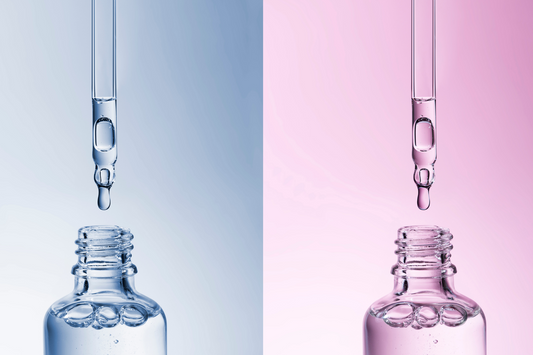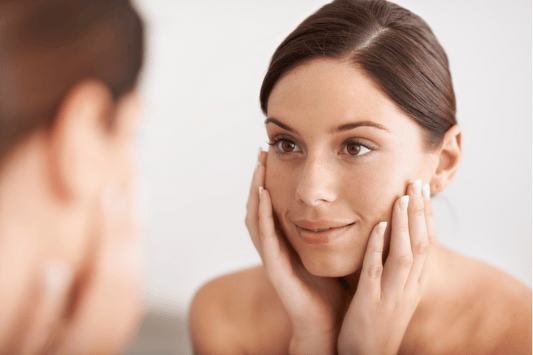Recently, whether or not sulfate-free shampoos are good for hair loss has been a hot topic of debate. The answer ultimately depends on your hair and skin type.
The thing is, we rarely associate hair loss with the products we use on an everyday basis. Rather, we tend to blame hair loss on genetics or medical conditions. However, one of the contributing factors may just be the haircare products we use daily, such as our conditioner or shampoo.
We're here to dig in to your burning question. Are sulfate-free shampoos good for hair loss? Read on to learn more.
What Are Sulfates?
Sulfates are salts formed from sulfuric acid that can pull dirt and oil away from your hair and scalp. Sulfates are usually used in cleaning products to lower the surface tension in water. When sulfates are not present, it is marginally harder for soaps to mix with water and to clean oils. Sulfates are often found in soaps, detergents, lubricants, herbicides, adhesives, and fabric softeners.
Besides cleansing, sulfates may also be found as components of conditioning and strengthening agents that do not function as surfactants. Sulfates are essentially present in many everyday and household items, including food.
Sodium lauryl sulfate (SLS), sodium laureth sulfate (SLES), and ammonium laureth sulfate (ALS) are the most common sulfates used in soaps, shampoos and cosmetic products. Of the three, sodium lauryl sulfate, depending on the formulation, is can be by far the harshest, and has been most often reported to cause dry skin, irritation and allergic reactions.
Why Are There Sulfates in Shampoos?
The nice thing about sulfates, and one of the main reasons why people prefer sulfate-containing shampoos is because they create a nice lather while simultaneously remove oils and other dust particles or allergens from your hair. This gives the perception of a 'deeper clean' since they foam much more easily than sulfate-free shampoos, which don't foam as much.
What Sulfate Shampoos Do to Your Hair
Sulfates have been were widely used in hair care products from the beginning of the 20th century. Only more recently has emerging scientific evidence started to question whether or not sulfates can cause dry, brittle, or even frizzy hair. Even among hair care professionals, significant debate has been ongoing surrounding sulfates in shampoos. Are they good for your hair, or are they bad?
-
Disadvantages of sulfate-free shampoos
There is no doubt that sulfates do a great job in the sense that they make shampoo far more effective at removing oils from your hair. Because they create suds, sulfates can easily wash away dead skin cells and dirt from your hair and scalp without requiring vigorous scrubbing. This is the main downside of sulfate-free shampoos.
-
Advantages of sulfate-free shampoos
On the flip side, our hair and scalp require oil as a natural barrier against harsh agents and toxins. These natural oils keep your hair and scalp healthy and hydrated. Sulfates, on the other hand, remove much of the natural oils from your scalp and hair. This gets rid of their natural moisturizing and protective properties, and can make your hair dry and brittle by weakening the outer cuticle. When sulfates contact your scalp (which is where we generally focus most of our scrubbing), it can break down the top layer of our skin - too much of a good thing can cause dryness and inflammation. Thus, people who use shampoos with sulfates can struggle with scalp irritation and may even experience hair loss, in the most extreme of situations. It can also potentially cause irritation around your eyes and on your skin, and may lead to clogged pores and increased acne.
So do Sulfate-Free Shampoos Work?
People frequently wonder if sulfate-free shampoos are as effective as sulfate-containing shampoos. And the answer is determined by your hair type. Many people prefer sulfate shampoos because they believe they get cleaner hair and don't have to work as hard to create a lather. Indeed, some people are perfectly content with using sulfate shampoos and experience no negative side effects or outcomes.
On the other hand, many others may respond better to sulfate-free shampoos. Sulfate-free shampoos clean your head and scalp, but they may require more effort to massage into your scalp. While many people can use sulfate-based shampoos without experiencing hair loss, there are several individuals who should consider sulfate-free hair products, especially if they have drier skin or drier hair:
- People with autoimmune disease
- Women in menopause and beyond
- Older adults
- People with dry skin and hair
- Those who have frizzy or kinky hair
- People who color their hair
- Anyone suffering from, or at risk for, hair loss
If you choose to use sulfate-containing products, you need to make sure you are also using a conditioner to rehydrate and protect your hair strands after washing. Additionally, unless your hair is very greasy, it is better to not wash away your scalps natural oils every day if you use a sulfate shampoo.
Your Gentle Friend
Sulfate-free shampoos are gentler than shampoos that contain sulfates and are generally not associated with hair loss, making them an excellent cleansing option for the majority of people. If you have particularly oily hair, however, you may be better off using a shampoo with milder sulfates (like ALS) instead of a sulfate-free shampoo.
The causes of hair loss are difficult to pinpoint. For some, it could be due to genetics, while for others, it may be rooted in an autoimmune disease or another medical condition. However, we must acknowledge that hair loss is not always the result of a physiological process; it may also be the result of our environment and the products we use on a regular basis. Overusing sulfates is much more likely to cause hair loss. This is because abrasive sulfates can irritate your scalp's skin, which can lower the protein content of your hair and cause the cuticle and shaft of your hair to break down.
You may want to switch to a shampoo that is gentler on your hair and scalp if you're already noticing the first signs of hair loss. If you’re looking for something to stop thinning hair, Revela has the ideal treatment for you if you're searching for something that is supported by science! Our ground-breaking hair loss solution, the Hair Revival Serum has been clinically tested to provide visible results starting in 6-8 weeks. Our main ingredient, ProCelinyl, works directly at the problem by absorbing into your follicles and essentially telling them "it's time to wake up!"





